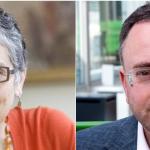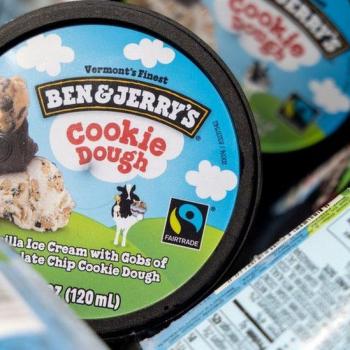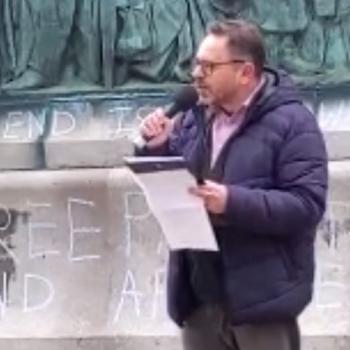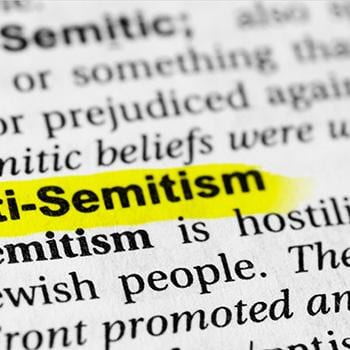My father passed away last week, aged 93, after a short illness.
I reached his bedside too late to be with him in his final moments. But with two of our children, Evie and Solomon, alongside me, we were able to say Kaddish (the Jewish memorial prayer), read aloud the traditional psalms for the departed, and say the Shema (the central prayer of Jewish monotheistic devotion). Most importantly, I kissed his forehead and said ‘thank you’ many times for all he had given to me and my family.
In Judaism, the rituals for mourning and burial kick in quickly and funerals take place within 24 hours of the death. The evening of my father’s passing was the only time to speak to my sister, our partners, and to his grandchildren to gather our memories for the eulogy (‘hesped’ in Hebrew) which I gave the following day.
Inevitably, the death of a parent takes you to a place of deep reflection. How can you measure their life and draw meaning from more than 90 years of events and relationships? What made them the person they were? How did they touch the lives of others? And what thinking and behaviour have become your inheritance? Every life is unique and special however ordinary it may have looked from the outside. My father led an outwardly unremarkable life but lived through remarkable times as both a European Jew and British citizen. As an adult, I came to love and respect the way he had lived his life more and more. My father was dignified, responsible and caring. What better role model could I have had.
What follows is the ‘hesped’ I gave at our father’s funeral and expanded upon at the last night of prayers at my sister’s home in London. I have inevitably failed to capture all that could and should be said about a life well lived.
‘A splendid fellow’
Our father Lionel Cohen was born on the 30th May 1926, the fifth child, the fifth son, the youngest son, of Pearl and Harry Cohen. He was born in South London.
His brothers had biblical names. Eli, known as Samuel. Abraham, known as Alfred. Jacob known as Jack. And David, known as David.
But for some reason when Harry and Pearl got to their fifth son, they thought the Hebrew Bible was exhausted as a source of inspiration. So, they called our father ‘Frank’.
From an early age, Frank decided he preferred his middle name, equally unbiblical, and so Lionel he was.
As the last son at home he enjoyed more time with his mother than any of his brothers had. She taught him to cook. Chicken Soup and chopped liver becoming his specialties. I like to think that both these recipes learnt from his mother Pearl undoubtedly contributed to his long and healthy life. And when Pearl was embroidering Challah cloths, Lionel would trace the outlines of candle sticks or menorahs to guide his mother’s sewing.
I always knew that Lionel was close to his brother Alfred. It was Alfred, rather than his mum or dad, who would take him up to London to visit the science museum. Alfred, ten years older than Lionel, became his affectionate second father, the brother with the sparkle in his eyes and a poet’s outlook on the world. I suspect those trips to Kensington may have been the origins of our father’s interest in how things in the material world worked and fitted together.
Talking to my cousins this week and discovering photos I’d never seen, I’ve learnt more about our Dad’s fondness for his brother David, five years his elder. While my father was typically earnest and reserved, David was outgoing and fun-loving. David came back from the war with a shrapnel wound to the head. Later he developed a brain tumour which he died from while still in his 30s. When I was growing up, my Dad said little about David even when I asked him to. Now I understand that this wasn’t because he had nothing to say about David but because he had too much to say and didn’t know where to start or what would happen if he did.
My father began training as an apprentice engineer during the second world war, while his older brothers were all on active service. He went to night school in the evenings to gain his qualifications and kept all his old school books – full of trigonometry – long enough to show, and rather intimidate, his own children 30 years later.
Only later did it occur to me how proud he was of having worked every day at the local engineering firm, Elliot Brothers, and then how he had to study all night too. And if you ever missed a week, he used to tell us, “it was impossible to ever catch up”.
I loved his stories of being an apprentice. My favourite was when he was told, by a grinning foreman, to go down to the store room and ask the storeroom manager for a ‘LONG WEIGHT’. “Just sit there in the corner young man”, said the storeroom manager, “and I’ll let you know when it’s ready.” It was of course, a long wait.
In his 20s and 30s Lionel won his stripes and rose up the ranks of the Jewish Lads’ Brigade. He would recount stories of taking hundreds of boys from South London for summer camp at Deal on the Kent Coast. That community spirit and commitment stayed with him as both he and our mother, Valerie, became active in the life of Bromley Reform Synagogue and with B’nai B’rith for many years.
Lionel and Valerie married in 1961, Suzy was born a year later and I arrived in 1965.
Lionel enjoyed his work, especially the sales trips he made to Eastern Europe including to the Gdańsk shipyards in Poland. It was on one of these trips that he also visited Auschwitz, long before it became the busy tourist attraction it is today. It wasn’t until 2015 that he gave me a full account of what he saw and heard that day.
Lionel’s first employer, Elliot Brothers became Elliot Automation, which in turn was bought by GEC. Lionel ended his engineering career as the managing director of a GEC factory in Dartford, Kent in the late 1970s.
After being made redundant in his early 50s, Lionel set up a high street printing business with his brother Jack and sister in law Lenora on the Old Kent Road, that great historic thoroughfare which pilgrims to Canterbury once set out from. That’s how he also become my first boss, teaching me how to serve customers with respect and efficiency and fix paper jams in photocopiers during my teenage school holidays.
Around the same time, Lionel became a consultant for the government’s small business advisory service, helping younger entrepreneurs overcome everyday business difficulties. Passing on his knowledge and experience gave him immense satisfaction, perhaps the most satisfaction of all the work he did.
When Suzy and I were talking about our father the night before the funeral, we found ourselves sharing the same words to describe him and many of the same memories.
Kind, patient, pragmatic and calm. Correct, polite and diplomatic. These were the words we both agreed on immediately.
He also had a strong sense of responsibility and fairness, something I first discovered when talking to him about the miners’ strike of 1984/5 and seeing his empathy and concern for how the the colliery communities were being destroyed. This from a man who lived in the middle class suburbs of London.
Suzy and I both remembered his patience when helping us with our homework at the dining room table. Whatever else he passed on to his children, competence with maths and physics were not on the list. The dining room table arrangement worked well for both of us for many years until we had to take exams and found we couldn’t smuggle our father into the exam hall.
There was no shortage of the ways Lionel showed kindness.
The kindness in how he looked after our Grandmother Elsie in her final years.
The kindness and welcome he showed to my wife Anne from the first day he met her when I brought her into the shop in the Old Kent Road.
And in his own last years, the kindness with which he cared for our mother which he always described as an “enormous privilege”.
There are other memories too.
He was a good swimmer. He would take my sister and I to West Wickham swimming baths on a Sunday when we were little and I could climb on his back in the shallow end and he would swim the length of the pool right to the deep end. I was safe and he was strong. The best feeling a six year old son could ever have.
Later when Suzy became particular about the shoes she wore, our mother delegated those stressful shopping trips to our father who had the patience to schlep around every one of Bromley’s shoe shops, of which there were no shortage, until Suzy found exactly what she wanted.
It was our father that read us bedtime stories. One story which Suzy and I asked for time and time again was David Kossoff’s re-telling of David and Goliath, with the young giant slayer – too skinny to wear any armour. It was a story of the weak triumphing over the strong when God was on your side – a strand of Jewish ethics that has stayed with me ever since.
Much later, there was the Passover Seder at Suzy and Jonathan’s, the first for our eldest daughter Rosie. We all watched as Rosie, sitting on her grandfather’s lap, slowly drifted to sleep as his warm, lilting voice recounted the strange rabbinical mathematics of the Haggadah which turns ten plagues into 300. Lionel was enjoying the medieval sums by the Red Sea too much to notice what was happening right in front of him.
Lionel was a private person. He rarely showed his emotions or vulnerability. This was the flip side of all that calmness and pragmatism. But it could at times drive our mother crazy!
The politeness and kindness were there right to the end. From hospital consultants to cab drivers, Lionel treated everyone with respect and thoughtfulness. “Thank you for coming”, “thank you for helping.”
In later years when I would visit them for a night, after a work meeting in London, I’d sit with my Dad at that same dining room table where he’d helped us with our maths and physics. Except now I’d turn the conversation to my own preferred subjects: Jewish history and politics. He would listen attentively about my concerns as to the place where I feared things were heading. I would remind him about how he’d read us the story of David and Goliath and try and blame him for sowing the seeds of my dissident Jewish opinions. Most important for me, was not that he agreed with anything I said, but that that he was willing to listen and follow my reasoning and my concerns.
Judaism has many thoughts about what happens to us after death. You can find scripture for just about every possibility. But mostly Judaism is silent on the matter. It’s a sort of theological humility. We don’t know and we don’t need to know. Judaism, we are taught, is much more bothered by the here and now, and even expects mourners to behave that way.
But wherever Lionel is right now, I hope he finds his brothers there, all of them, who have gone before him. Sam, Alfred, Jack and David – Pearl and Harry Cohen’s boys – all looking as tall, strong and utterly indestructible as they do in the photographs from the 1940s and 50s which Suzy and I have been looking through in the last few days.
In particular, I hope Alfred is there to show him around the place, just like he showed my father around the Science Museum eighty years ago. Alfred will be good at explaining what makes the non-physical world work and fit together. And I hope David is there too, the fun-loving brother who died too soon.
The Friday before last was the final time I saw our father alive. I held his hand. I stroked his white hair and I kissed his check. I thought it would probably be our last goodbye.
“Thank you for coming,” he whispered. The politeness still there, right at the very end. And then the words he would say to me whenever we parted: “You’re a splendid fellow!”
I whispered back into his ear. “No, you’re a splendid fellow!”
Lionel, Daddy, Grandpa, Great-grandpa. Thank you for coming. You were here with us for 93 years and you were always a splendid fellow.
May the One whose name is magnified and sanctified in our Kaddish prayer, cradle you, like you once cradled us. May your soul find eternal rest and peace. And may your name be a blessed memory to all who have known and loved you.
Amen.
















